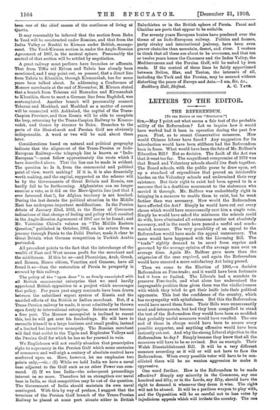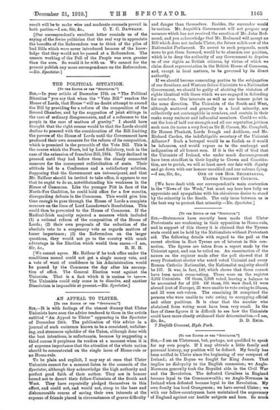LETTERS TO THE EDITOR.
THE REFERENDUM.
[TO THE EDITOR 01 THE SPECTATOR...1
Srn,—May I point out what seems a fair test of the probable utility of the Referendum P Let us inquire how it would have worked bad it been in operation during the past few years. First, as to recent Conservative measures. How would Chinese labour have fared P Any suggestion for its introduction would have been stillborn had the Referendum been in force. What would have been the fate of Mr. Balfour's Education Bill? Not so decisive. The fault of the Act was that it went too far. The magnificent compromise of 1870 was that Board and Voluntary schools should live flush together. The Board schools, with the public purse to draw upon, set up a standard of expenditure that proved an intolerable burden on the Voluntary schools and undermined their very existence. But their right to exist had been agreed to in a measure that is a deathless monument to the statesman who carried it through. Mr. Balfour was undoubtedly right in bringing in a measure to enable them to exist, but he went farther than was necessary. How would the Referendum have affected the Act? Simply he would have cut out every clause which would have unnecessarily cost him a single vote. Simply he would have asked the minimum the schools could do with, have eliminated all extraneous matter not absolutely necessary, and in the result have passed a useful and much- wanted measure. The very possibility of an appeal to the Referendum would have made the appeal unnecessary. The same would have happened with the Licensing Bill. The "trade" rightly demand to be saved from caprice and governed by the average opinion of the average man over an average time. Again Mr. Balfour gave more than the exigencies of the case required, and again the Referendum would have ensured a more satisfactory Act being passed.
Then we come to the Election of 1906,—a decisive Referendum on Free-trade; and it would have been fortunate had it been so limited. The Liberals had a mandate to preserve Free-trade, and what alone has undermined the impregnable position thus given them was the vindictiveness with which they tried to get their knife into their political opponents. This lost the confidence of the country, which has no sympathy with spitefulness. But this the Referendum would have saved them from. Their Bills were unnecessarily cruel and intemperate, but had they been compelled to stand the test of the Referendum they would have been so modified that probably useful measures would have resulted. The one end of those in charge would have been to secure every possible supporter, and anything offensive would have been instantly cut out. And why the strong Liberal objection to the Referendum to-day ? Simply because they know that all the measures will have to be so revised. But an example. Their Welsh Disestablishment Bill. It will be a very different measure according as it will or will not have to face the Referendum. When every possible voter will have to be con- ciliated there will be no wanton aggression to make it oppressive.
One word further. How is the Referendum to be made effective P Simply any minority in the Commons, say one hundred and fifty, or in the Lords, say fifty, should have the right to demand it whenever they deem it wise. The right will not be abused. It will be a perilous weapon to play with, and the Opposition will be as careful not to lose votes by injudicious appeals which will irritate the country. The one result will be to make wise and moderate counsels prevail in
[Our correspondent's excellent letter reminds us of the saying of the Swiss politician that the real way to appreciate the benefits of the Referendum was to think of the piles of bad Bills which were never introduced because of the know- ledge that they would not be passed at a Referendum. The unseen working of the Poll of the People was even greater than the seen. So would it be with us. We cannot for the present publish any more correspondence on the Referendum. —En. Spectator.]







































 Previous page
Previous page